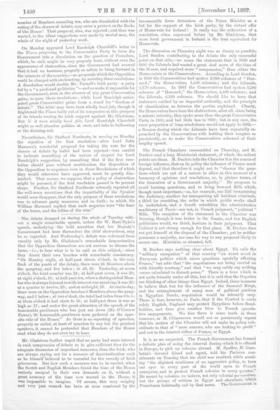The debate dragged on during the whole of Tuesday with-
out a single remarkable speech, unless Sir W. Hart-Dyke's speech, embodying the bold assertion that her Majesty's Government had been themselves the chief obstructives, may be so regarded. And Wednesday's debate was redeemed from vacuity only by Mr. Gladstone's remarkable demonstration that the Opposition themselves are not anxious to discuss the issue,—i.e., to hear what is to be said on this subject,—since they desert their own benches with remarkable consistency. "On Monday night, at half-past eleven o'clock, in the very flush of the youth of the debate, there were 21 Members above the gangway, and five below ; in all, 26. Yesterday, at seven o'clock, the total number was 24; at half-past seven, it was 20; at eight o'clock, 10; at half-past ten, when a distinguished Mem- ber who is always listened to with interest was speaking, it was 28; at a quarter to twelve, 23; and at midnight, 18. At one to-day, there were on the Opposition benches 5 Members above the gang- way, and 1 below ; at two o'clock, the total had fallen from 6 to 5; at three o'clock it had risen to 16; at half-past three it was as high as 17; and under the great attraction of the speech of the honourable gentleman who has just sat down (Mr, O'Connor Power), 36 honourable gentlemen were gathered on the oppo- site side of the House." As there is no reporting of speeches, properly so called, at least of speeches by any but the greatest speakers, it cannot be pretended that Members of the House read what they do not even try to hear.






































 Previous page
Previous page